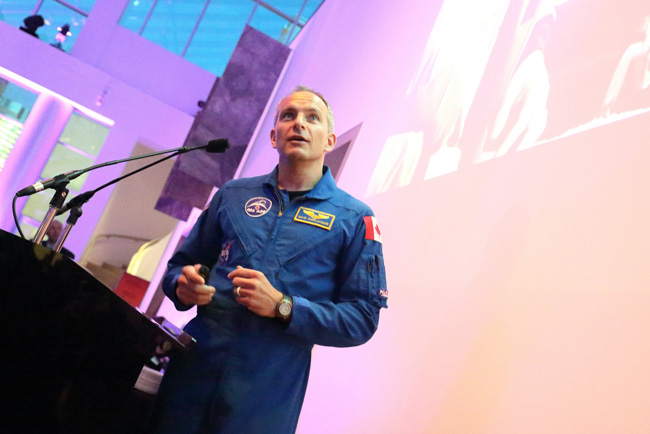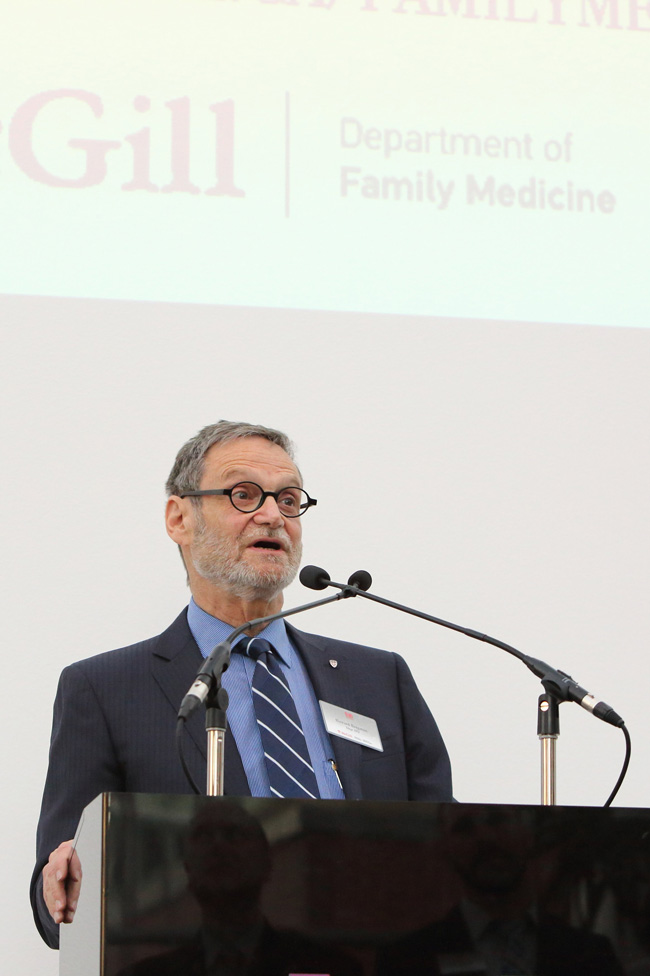
By Jason Clement
When it was founded four decades ago, the Department of Family Medicine at McGill had but a handful of members. How times have changed! As the Department celebrates its 40th anniversary in 2016, it has become the largest single department in the Faculty of Medicine. It now trains more than 200 residents. More than 100,000 patients are registered across its six training sites. The Department also boasts unique and vibrant research and MSc and PhD programs which has seen its ranks rise to 46 graduate students today since its inception in 2009.

In honour of the milestone anniversary of the Department, a series of events have been planned. The celebration kicked off on the evening of May 5, with a Homecoming Gala that welcomed close to 150 past and present Department graduates, teachers, members and friends for an evening of fine dining, art, music and conversation at an event held at Montreal’s Museum of Fine Arts. A highlight of the Gala was an inspiring talk delivered by David Saint-Jacques, a graduate of McGill’s Family Medicine residency program and a Canadian Space Agency Astronaut – the second family medicine graduate to become an astronaut.
The Gala was followed the next day with a Primary Care Policy Symposium designed to spur discussion and contribute to the development of a comprehensive vision and roadmap for primary care in Quebec. A capacity-crowd of 300 participants filled the room at the Centre Mont-Royal. The Symposium was opened by McGill Principal and Vice-Chancellor Suzanne Fortier and closed by Dr. David Eidelman, Vice-Principal (Health Affairs) and Dean of the Faculty of Medicine at McGill. The stellar line-up of invited speakers included three former Quebec provincial cabinet ministers and health care commission chairs, Claude Castonguay, Dr. Jean Rochon and Michel Clair.
Combined with vigorous participant discussion, the speakers from Quebec, Ontario and England emphasized that successful policy and its implementation require developing and promoting a shared vision in the population and among those working on the front lines. Several key problems were identified during the course of the Symposium, including a lack of respectful public discussion, a top down approach based on union negotiation and excessive centralization and micro management.

“There is no doubt that primary care is at a crossroads in Quebec,” said Dr. Howard Bergman, Chair of the Department of Family Medicine at McGill, highlighting some of the challenges of the past year for primary care in Quebec with the adoptions of Law 10, Law 20 and the last minute compromise with the Fédération des médecins omnipraticiens du Québec, as well as two new management frameworks that are not widely known to the public. “We have yet to understand the full impact of these policy changes on the practice and the teaching of family physicians and more importantly on the quality of patient care.”
Although the current climate has led to cynicism and discouragement not only among front line workers but also in the population, the room was filled with a great deal of energy, with people calling for solutions based on key elements including: patient, population and community engagement; population responsibility through local governance of primary care based on transparency and accountability; change based upon user-centered design process; innovation and entrepreneurship promoting diversity and pluralism rather than one size fits all; quality being fundamental with quality improvement based upon peer-led process; and a collaborative clinical model based on the partnership between the primary care team (physician, nurse and other health care professionals) and the patient.
“Successful implementation also requires iterative improvement through accountability and population input,” Dr. Bergman told the captivated and engaged audience, who rewarded him with a standing ovation at the end of the day, but only after serenading Claude Castonguay, former Quebec Minister of Health and head of the Castonguay Commission with a spontaneous rendition of Happy Birthday. “Yet, in spite of the importance and the intensity of the primary care reforms, many observers have noted that there has been essentially no attempt to engage the population and the stakeholders leading for calls for open, non-partisan and respectful public policy discussion on the health care reform. We are excited to celebrate the milestone of the Department’s 40th anniversary with an exercise that exemplifies the heart of family medicine: reflecting on actions that take us from evidence-informed practice to policy, and back again, to collectively co-design our future.”
The results of the Symposium will be synthesized, with the summary, the slides and video of the day to be made available through the Department of Family Medicine’s website. Most importantly, for Dr. Bergman, this symposium must be seen as a first step in widening the conversation and in proposing solutions for wider public policy discussion.
The Department will continue celebrating its anniversary on June 3 when it hosts the McGill Symposium on Complementary Health, a one-day academic symposium on research aspects of complementary health and integrative medicine at New Residence Hall.
